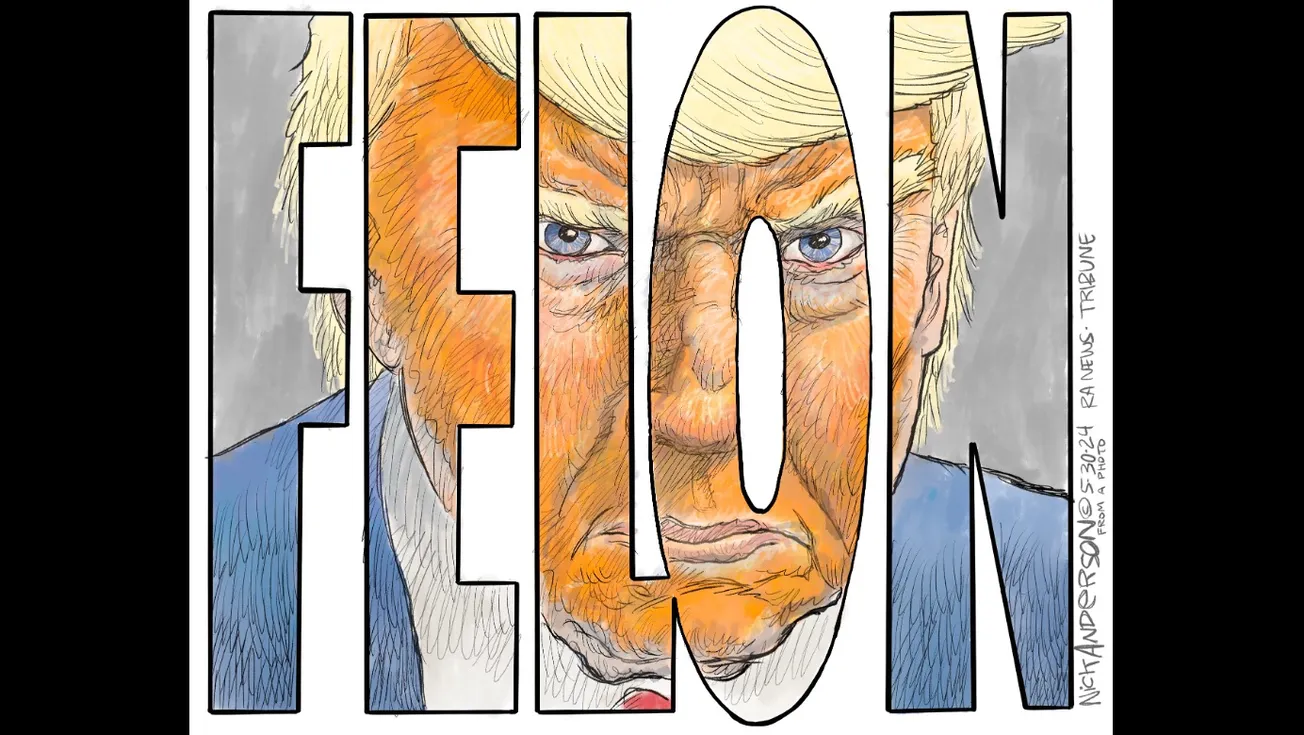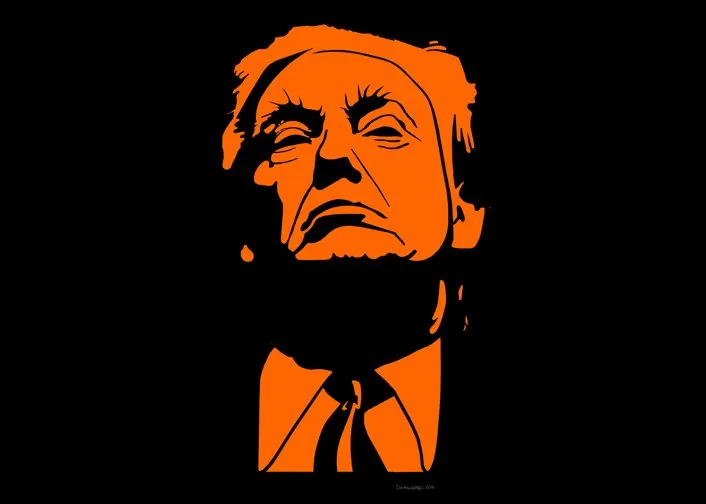On May 30, 2024, Donald Trump was convicted on thirty-four felony charges by a jury of twelve ordinary Americans in a New York state court. As we write this, Trump is now, officially, a convicted felon.
Since Trump has been on trial for over a year now in multiple jurisdictions for various alleged crimes, it’s easy to lose track of who’s charging him with what and how his various trials are going.
Here’s an explainer to catch you up on this one.
Which trial was this?
This was the New York state trial, often called “the hush money trial” or “the election deception trial”. Using hush money to keep information from voters in the 2016 election is what got him into felony trouble.
PBS NewsHour has a good rundown of the other major cases against Trump.
What did Trump do that finally got him convicted of felonies?
There are a few layers to this. Ultimately, all of the thirty-four counts relate to the same acts—each count pertained to one document. The charge was “falsifying business records in the first degree.”
Trump has allegedly had multiple affairs with multiple women. Two of those women, former model Karen McDougal and porn performer Stormy Daniels, came forward separately with their respective stories.
McDougal came forward first. David Pecker, then the publisher of the National Enquirer tabloid, purchased the rights to her story—then, pursuant to a 2015 agreement with Trump, never published it. (This is the “catch-and-kill” strategy you might have heard about.)
Part of that agreement was for Michael Cohen, Trump’s then-attorney and “fixer,” to purchase the contract from Pecker and then be reimbursed by the Trump Organization. The AP’s timeline says that Pecker canceled the sale and Cohen did not pay him in this instance.
When Daniels came forward, Pecker refused to do the same thing again. So Cohen paid her himself and then got reimbursed by the Trump Organization. (This act, carried out at the direction of “Individual-1,” was one of the felony charges for which Cohen himself was convicted in 2018 and sentenced to three years in prison.)
Rather than write “reimbursement for killing story about affair (no, not that one, the other one)” on the business’s books, these reimbursements were categorized as routine business expenses such as consulting fees. This is the basis for the charge of “falsifying business records.”
Although the reimbursements to Cohen happened in 2017, which was after the election, the scheme began in 2015 and was specifically intended to keep information from voters. That made it a violation of a New York state law that prohibits committing a crime in order to promote or prevent the election of a person to public office. Under that law, the falsification of business records became a first-degree charge and a felony because it was committed as part of the plot to conceal the affairs so that Trump could get elected.
In short: Trump masterminded a scheme to suppress damaging information about him from coming out ahead of the 2016 election, paid Cohen for his part in that scheme out of the Trump Organization’s accounts, and disguised those reimbursements as routine business expenses. In so doing, Trump falsified business records in order to win the 2016 election—and that’s a felony in the state of New York.
Will Trump go to prison?
This was Trump’s first criminal conviction, and it was for a white-collar crime, so it’s not likely.
We’ll know for sure on July 11, when Judge Juan Merchan hands down Trump’s sentence.
Is this final? Can he appeal?
He can appeal, though only up to a point. Former criminal defense attorney Teri Kanefield has a general explainer on how criminal appeals work.
The window for Trump to appeal the conviction opens upon sentencing. After July 11, he’ll have 30 days to begin his appeal. If and when he does, the appeals process will take as long as it takes.
We’re not attorneys—here or in New York state—so we won’t speculate on his chances at appeal or how long it might take. We would encourage folks to ignore anyone pretending to have a crystal ball. All we can do is hope Trump’s conviction sticks—and keep working to win this year’s election in the meantime.
Does this mean he’s finally ineligible to be elected president?
No.
The framers of the Constitution apparently never imagined that somebody who’d commit felonies to get elected might be a major-party presidential nominee. And state laws that forbid people with felony convictions from running for state or local office don’t apply to federal office.
Absent the Supreme Court finding that Trump is ineligible under the 14th Amendment’s provision that disqualifies insurrectionists from running for office, he’s still eligible for a second term.
Can the Supreme Court throw out Trump’s conviction?
Never say never, but we’ll call it unlikely.
There is a case before the Supreme Court on the question of whether sitting presidents are immune from criminal prosecution. Special Counsel Jack Smith has charged Trump for his efforts to overturn the 2020 election, including the violent insurrection at the Capitol on January 6, 2021. Trump has appealed that case to the Supreme Court, claiming that he’s immune from prosecution for those actions solely because he was president. (We are, of course, hoping he loses embarrassingly.)
That case wouldn’t apply to the New York charges. This felonious scheme began in 2015, before he was elected. He was a private citizen then, so even if the Trump-favoring judges on the Supreme Court decide that the president is above the law, Trump in 2015 was not.
We don’t put anything past this Supreme Court, stacked as it is with Trump’s hand-picked judges, but even so, this SCOTUS hasn’t always ruled Trump’s way. We can hope that Trump’s idea of total presidential immunity is just too big for even this Court to swallow.
Trump is now a convicted felon. Does that mean he can’t vote?
As delicious as the irony might be, no, Trump’s conviction in New York doesn’t disenfranchise him in Florida, where he is registered to vote. Per the analysis reported by NPR, Trump would need to be in prison as of Election Day to be barred from voting.
Moreover, there’s the question of whether people with felony convictions even should be disenfranchised. The law should treat Trump like any other American—unequal treatment and felony disenfranchisement are two wrongs that don’t make a right.
What does this mean for the 2024 campaign?
As a practical matter, not much. Millions of Democrats, independents, and never-Trump Republicans who weren’t going to vote for him in the first place still aren’t, and the die-hard Trumpists will vote for him anyway.
Voter outreach and registration efforts will continue mostly unchanged, although you might start to see and hear the phrase “convicted felon Donald Trump” in political messaging. There are persuadable people who haven’t heard that Trump is now a convicted felon, and some of them can be moved upon learning that fact; expect much effort to be expended in the next several months to hammer that point home to as many people as possible.
Our mission for the 2024 election remains the same: Re-elect President Joe Biden and win as large a Democratic Majority as we can in both the House and Senate so he can get back to serving the needs of all Americans.
References
- Former President Trump is found guilty in historic New York criminal case, NPR, 2024-05-30
- Read Transcripts From Trump’s Manhattan Criminal Trial, New York Times, 2024-05-30
- Falsifying business records in the second degree, New York State Open Legislation
- Falsifying business records in the first degree, New York State Open Legislation
- Timeline: Donald Trump, Stormy Daniels and the $130,000 payment to buy her silence, CBS News, 2024-04-15
- Trump hush money trial: A timeline of key events in the case, Associated Press, 2024-05-13
- Legal experts say Trump's conviction is unlikely to lead to a prison sentence, NPR, 2024-05-30
- Trump’s 2024 trials: Where they stand and what to expect, PBS NewsHour, published 2024-01-25 and last updated 2024-06-03
- Southern District of New York | Michael Cohen Pleads Guilty In Manhattan Federal Court To Eight Counts, Including Criminal Tax Evasion And Campaign Finance Violations, United States Department of Justice
- Michael Cohen ends prison term after Trump-related crimes, AP News
More resources that go beyond what we covered in this recap
- Why Trump Is Guilty of 34 Felony Counts ft. Liz Dye, LegalEagle YouTube channel, 2024-06-03 (explores two other predicate crimes that could be the basis of the first-degree felony escalation)
- Federal Legal Implications of Former President Donald Trump’s Conviction in New York State Court: Frequently Asked Questions, Congressional Research Service, 2024-06-05 (explores additional possible future scenarios)
--30--
Cross-posted from Indivisible San Francisco.
Comments







